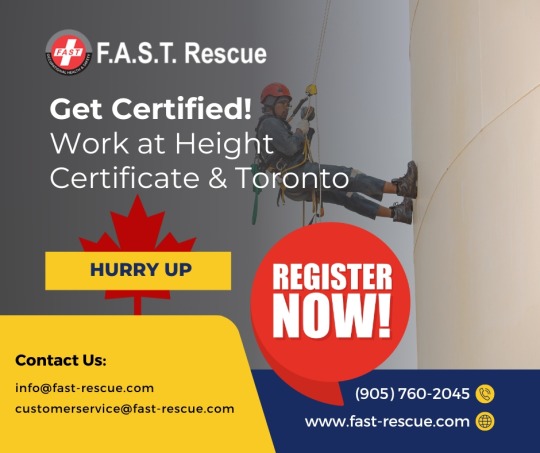#Work At Height
Explore tagged Tumblr posts
Text
Construction netting systems are vital in enhancing safety and security on construction sites, particularly in high-rise projects where the risks are amplified. By deploying advanced netting solutions such as WEB Net®, construction professionals can mitigate hazards, protect their workforce, and ensure project success. From fall protection to debris containment, these systems offer a comprehensive safety solution for the modern construction industry.
#WEB Net#Walk On Netting Systems#construction netting system#work at height#engineered netting solutions#high-rise construction netting system
0 notes
Text
Working at Heights Certificate in Toronto

Work at Height Certificate Toronto ensures that individuals engaged in roles like construction, maintenance, and outdoor work are well-trained in safety practices for working at heights. It’s crucial for anyone in these positions to understand how to stay safe.
At F.A.S.T. Rescue, we offer a comprehensive training program designed to teach you everything you need to know about safety when working at heights. Our course meets all Ontario safety standards.
Why Choose F.A.S.T. Rescue for Your Safety Training?
Official Recognition: Our training is approved and complies with the latest safety standards.
In-Depth Lessons: We cover all aspects of safety, from proper equipment use to understanding regulations.
Course Information
Who Can Join: No special skills are required to start; the training is open to everyone.
Certification: The one-day course lasts 8 hours, and upon completion, you receive a certificate valid for three years.
Skills Acquired: Learn to use safety equipment correctly, comply with legal requirements, and identify potential hazards.
What’s Covered in the Course
Recognizing Hazards: Identify potential dangers before they lead to accidents.
Handling Equipment: Learn to inspect and use safety equipment properly.
Following Regulations: Understand the legal requirements to ensure workplace safety.
Books and Tests
Free Materials: All necessary books and materials are provided at no extra cost.
Testing Requirements: You must score at least 75% on both the written and practical tests to pass.
Where and When
Location: The training takes place at 750 Oakdale Rd., Suite 56, Toronto, ON, with free parking available.
ID Required: Bring a government-issued photo ID to receive your certificate.
Why This Training Matters
Accident Prevention: Proper training significantly reduces the risk of falls and injuries.
Regulatory Compliance: Certification ensures you meet legal requirements, benefiting both you and your employer.
Increased Safety: Gain confidence and work more effectively with the right safety practices.
Sign Up Now: Be Safe and Confident
Ready to enhance your safety skills for working at heights? Register for our ‘Working at Heights Training’ program today. Whether you’re new or need to refresh your skills, this training is perfect for you.
Click here to register for our next session and start working more safely. Your safety is our priority, and we are committed to equipping you with essential skills.
For more details or to sign up, email us at [email protected] or call (905) 760-2045. Our team is ready to assist you. Take the first step towards a safer work environment with F.A.S.T. Rescue’s expert training.
#Work at Height Certificate Toronto#Work at Height Certificate#Work at Height#Working at Heights in Toronto#Canada#FAST Rescue#First Aid Training#Health and Safety#Training
0 notes
Text

Discover Innovation and Safety at Gas India Expo 2024
Join us at Hall No. 1, Booth 18 at the Gas India Expo 2024 to witness the future of safety and productivity in the gas and energy industry. Mtandt is proud to participate in this prestigious event, where we will be showcasing Under-deck access system and heavy-duty access road mats engineered to meet the evolving demands of the oil and gas sector.
Gas India Gas India Expo Gas India Expo 2024 Oil Industry Gas Industry Safety at Gas India Expo
#mtandt#construction#aerial work#fall protection#web deck#quick fixes#work at height#Gas india#under deck safety#oil and gas sector#Road mats#Gas india 2024#accident prevention
0 notes
Text

top part's bc i wanted to design a little sticker for myself - couldn't resist adding a little smooch (:< 2-for-1 combo of a little more of a size difference than i usually go for and the pointy ears @poly-hebdo draws derek with because it's cute as fuck
[find this and my other art on Redbubble!]
#teen wolf#derek hale#stiles stilinski#sterek#my art#drawing in this style (colored lines w/o pressure sensitivity and v simple shading) made me super nostalgic for my one piece era lol#did this in 10-minute breaks between moving and working the past few days#today is my first day off where I'm not out of the apartment from 8am-6pm in 3 weeks#time to DRAW#thought I'd throw a morsel out to the size difference crowd lol#I could get behind stiles having a late growth spurt post-nogitsune bc hey lack of sleep interferes with growth in adolescents#but almost-same-height-slightly-different-build is still my main squeeze
2K notes
·
View notes
Text
Method Statement & Risk Assessment for Scaffolding
We have compiled a 5 page combined method statement and Risk Assessment for scaffolding erection. The General Work Method (Key steps & stages of the work required) • Erect scaffolding under the supervision of a competent person. • Start by laying out base plates on stable ground and ensuring proper levelling. • Assemble scaffolding components following manufacturer’s instructions and design…

View On WordPress
1 note
·
View note
Text


The way he holds her like she’s so precious to him

DO YOU SEE HIM PROTECTING HER HEAD
#what is a man if he can’t take care of his girl#respectful hand placement#they are the same height and yet he can carry her AND RUN my boys been working out fr#the power of love#ken takakura#momo ayase#okarun#momo x okarun#okarun x momo#momokarun#dandadan
4K notes
·
View notes
Text

philza perch
#emerald duo#philza#philza fanart#technoblade#technoblade fanart#myart#dsmp#dsmp fanart#pretend i didnt chang phils height for this one so it would work lawl...
5K notes
·
View notes
Text
giving tim drake the illness. that boy doesn't have a spleen and when he gets the Normal Human Flu he is out for like two months. no one has ever been worse at being sick. his text chain with dick is just like
tim 8:07 pm
when i die do you want my playstation
dick i thought about it some more and im gonna give it to bart he likes games more. sorry I hope this doesn't hurt your feelings
i measured my heart rate and it's 83 but that seems high. that's too high right?
Cleveland clinic says asplenia can cause heart problems maybe i should call leslie
DONT TELL BRUCE BTW. HE DOESNT KNOW I'M SICK
or about the spleen thing either haha.
wait I told you about the spleen thing right?
haha
tim 9:12 pm
nvm I drank a gatorade All Good Boss!
(1 missed call - Dick Grayson 10:37 pm)
(1 missed call - Dick Grayson 10:38 pm)
(1 missed call - Dick Grayson 10:39 pm)
dick 10:40 pm
timothy drake I am at your door. let me in.
WHAT HAPPENED TO YOUR SPLEEN.
tim if you don't let me in i will call babs
tim if you don't let me in i will call babs and also I will tell her about your spleen
TIMOTHY!!!
#crucially babs knows about tim's spleen and has for years. it's noted in his file and everything!#“do not send on biohazard missions”#bruce also does know tim is sick he assumes tim is handling it. he is correct comma sort of#dcu#tim drake#also crucial to note tim wanted to delete those text messages but his brain isnt Working Great atm#at the height of his illness he left a really weepy voice memo for bruce about the honor of being robin#luckily he couldn't figure out how to send it unsecured. two days later he found it and deleted it in a fit of Incredible embarrassment
1K notes
·
View notes
Text
Comprehensive Guideline to Minimizing Risks During Work at Height

This comprehensive guide aims to dive into all aspects of lowering risk when working at heights, providing insights, methods, and best practices to ensure worker safety and the success of high-elevation projects.
From identifying potential hazards to implementing proactive safety protocols, this article provides a roadmap for organizations and professionals committed to fostering a secure environment in elevated work settings.
Content
1. Defining Work at Heights: What Elevated Work Means
2. The Importance of Safety While Working At Height
3. Hierarchy of Control During Work-at-height
4. Ladders vs Scaffolding: Selecting the Appropriate Access Equipment
5. Choosing the Quality Equipments And Assessing and Certification of Access Equipment
6. The Importance of Regular Equipment Inspection
7. Why Comprehensive Work at Heights Training is Crucial
8. Employer's Role: Fostering a Culture of Safety
Defining Work at Heights: What Elevated Work Means
Work at heights encompasses tasks performed at both elevated positions above and below ground level, where there is a risk of falling and potential for physical injury due to the nature of the work.
This includes activities conducted on ladders, scaffolds, rooftops, manholes, trenches, or any surface where a fall hazard exists.
The Importance of Safety While Working At Height
In any workplace, safety at heights is crucial. Safety at height holds paramount importance in any workplace, and almost no task can be completed without involving work at height.
About 80 to 90% of tasks done on-site involve working at heights, whether in construction or industry. Shockingly, 56% of workplace accidents occur during these tasks, causing injuries, fatalities, and significant financial losses. (As per OSHA report)
Employers need to focus on safety measures to reduce these risks and protect both their employees and the business.
Hierarchy of Control During Work-at-height
Elimination
Whenever feasible, avoiding work at height should be the primary objective. This can involve innovative planning and the utilization of technology to execute tasks from the ground level.
Prevention:
However, if work at height is inevitable, the focus should shift to preventive measures. This can involve engineering & administrative control.
Protection:
Despite robust preventive measures, the possibility of a fall cannot be entirely eliminated. In such cases, minimizing the consequences of a potential fall becomes necessary. This includes some part of the administrative control, appropriate personal protective equipment (PPE), preventing unauthorized access, and establishing emergency response protocols.
Ladders vs Scaffolding: Selecting the Appropriate Access Equipment
Choosing the right access equipment is significant in ensuring safety during work at heights. Ladders, work platforms, and scaffolding each have distinct characteristics and usage scenarios. The selection depends on factors like the nature of the task, height, duration, and safety standards.
Article: Types of Scaffolding: Which One is the Right Fit for Your Business Need?
Choosing the Quality Equipments And Assessing and Certification of Access Equipment
The quality and certification of access equipment are vital aspects that determine their suitability for use in elevated work environments. Adhering to recognized standards ensures that the equipment meets safety requirements and undergoes proper testing and validation. Ex: EN131 for ladder.
Article: Which Standard to be Followed for Ladder Safety
The Importance of Regular Equipment Inspection
Regular inspection and maintenance of height-related equipment are essential to guarantee their safe and efficient functioning. Pre-use checks, routine maintenance, and adherence to manufacturer guidelines enhance equipment reliability and longevity.
Ensure Safety with FRP Scaffolding Inspection Checklist | Expert Guide
Download For Free
Why Comprehensive Work at Heights Training is Crucial
Comprehensive training is crucial for individuals involved in work at heights. Work at height must be done by skilled individuals, and begins with pre-checks such as health check-ups, height phobia tests, and competency training for their associated roles, such as Scaffolders, Supervisors, and Inspectors.
Proper education equips workers with the requisite skills, knowledge, and situational awareness necessary to safely and efficiently execute tasks at elevated heights.
That's why The Safety First Mobile Access Tower Training Program plays an important role. Designed to empower individuals with comprehensive training.
Employer's Role: Fostering a Culture of Safety
Employers bear significant responsibility in creating and maintaining a safety-centric work culture. It is the legal responsibility of employers or anyone who controls the work of others (WAHR 2007) to provide adequate training, enforce safety protocols, foster awareness, and encourage active participation in safety initiatives. These contributions lead to a safer work environment for everyone involved in working at heights.
Conclusion
Understanding the nature of work at heights is crucial—it's about safety above all else. From controlling risks to choosing the right equipment and ensuring its quality, each step matters. Regular inspections and comprehensive training are the pillars that uphold safety in these environments. Selecting the proper equipment, whether ladders or scaffolding, is a critical decision. Yet, beyond tools, knowledge is key. Employers play a crucial role in fostering a safety-first culture. Their commitment to quality equipment, ongoing education, and strict safety protocols is fundamental. This guide serves as a compass, guiding everyone working at heights toward a safer and more secure future.
Why Youngman?
Safety and reliability are paramount and we at Youngman Manufacturing India understand this, offering a comprehensive Access Solution Range tailored to meet the diverse needs of working at heights. Reach out to us at: [email protected] or call: +91-9015964626
0 notes
Text

these kids are incredibly stressed out
#needed to update my bad kids drawing bec seeing it + the numerous breakups made me sad#so core bad kids only for now#please note very specific sneaker and height headcanons#kristen should be more buff but girly's got a lot going on she for sure isn't at her peak#the bad kids#fantasy high junior year#dimension 20#d20 fantasy high#fig faeth#gorgug thistlespring#riz gukgak#adaine abernant#kristen applebees#fabian seacaster#fabian is the only one with weapons bec he is incredibly extra#fhjy#dropout#fantasy high#d20 fanart#i need to work on more comics but rn i cant write bec real life projects are killing me#but character art is so fun and i needed to experience joy so i gave myself an afternoon to finish this and now i gotta stop#character art#ribbittrobbit
7K notes
·
View notes
Text






Call this the Whoopsie AU (it's barely an AU)
I mean. Narinder never explicitly SAID the Lamb would stay dead... :3c He probably should have been more specific. >:3c
Part Two:




Well. The Lamb tried, but...sorry, Nari, the crown hates you now. Shouldn't have been so quick to lend it out, I guess. :D
Aaaand Part Three:



'Isn't he just adorable?' -The Lamb, probably, while their followers smile and nod and internally scream at the brand new hellcat they now have to share living space with...
Anyway, nothing says 'Dead To Me' like following a person around to loudly remind them of how dead they are to you. Right? Right. Narinder's got this all figured out. <:]
#fanart#comics#cult of the lamb#cotl#narilamb#cotl lamb#cotl narinder#cotl yellow cat#this is my headcanon and i'm sticking to it#the lamb is a goofy stabby-babby goober and narinder is just a grumpy asshole who constantly velcroes onto them for hella snuggles#look - if you've been trapped in the afterlife void for over a thousand years - you are GONNA want a fuckton of snuggles#that's just science#the scribble comic i did with narinder and the yellow cat can technically work as part four i guess#only instead of the lamb Going Gremlin at the attempt to steal their other followers' devotion#they just comin' at him for Rad Cuddles OuO#someday i will draw these two with the proper height difference i imagine them having#today is not that day#today is also not the day i pin down exactly how long i want narinder's tail to be#(but i want it to be Very Long - just because)#there are inconsistencies here and there and probably some mistakes but i have been working on these for a week and i am So Tired guys#EDIT: haha yeah i forgot to color in narinder's fukken ears again#fuk :)#EDIT 2: i fixed it but it's probably too late at this point lmao#EDIT 3: THE LAMB'S FUKKEN HORNS JFC#i am not editing this thing anymore cuz i need sleep and the mistakes are already out there *dies of artist mortification*
6K notes
·
View notes
Text
frequently asked questions on emergency plan
What is a workplace emergency? A workplace emergency is an unforeseen situation that threatens the customers, employees or the public, disrupts or shuts down your operations, or causes physical or environmental damage. Name the different types of emergencies that can happen in the workplace. The different types of emergencies that can happen in the workplace…
0 notes
Text
youtube
WEB DECK INSTALLATION DEMO ACCESS SOLUTIONS.
WEB Deck is an innovative clip-on modular system which provides a stable and strong working platform for under-decks. It is suitable for a variety of work tasks and can be used by regular tradesmen without safety lines. The system is quickly installed to the underdeck of bridges, viaducts, jetties and oil platforms.
Fast Installation: Only seven days to install and fully encapsulate 300m2 of bridge under-deck.
Safe: fewer hours working at height; rope access is statistically safer than scaffolding.
Low cost: Efficient install leads to lower labour cost and lower total access cost.
Low self-weight: Suitable for weaker structures.
Full containment: The system includes side containment and full encapsulation where necessary.
#mtandt#construction#Web deck#Access solutions#Safety First#Quick Fixes#Fall Protection#Accident Prevention#Work at height#Rope access#Youtube
0 notes
Text
1 note
·
View note
Text






Second Place episode of Gamechanger feat the Aguefort staff aka Aguefort heaven is Porter hell. It’s a very efficient system
Bonus:

#aka this is Porter’s motivation for Jace [spoiler spoiler spoiler]#porter cliffbreaker#jace stardiamond#eugenia shadow#arthur aguefort#fantasy high#dimension 20#fhjy spoilers#dropout#game changer#brennan lee mulligan#sam reich#this has been in my head since before my finals and before the season ended… SAD#tbh I also think Jace could be gilear instead that would also work#jan arts#Jan.art#jan.mine#I do think Aguefort would subject his staff to game shows for personal enrichment#I did 100% draw this for the punchline of Jace undercutting Porter. I did do that#I don’t wanna talk abt the heights. I forgot to accommodate the heights. oh well#fhjy#fantasy high junior year#d20#game changer au#1k#2k
3K notes
·
View notes
Text
#working at heights#working at heights course#working at heights ticket#working at height#work at heights#working at heights training#working from heights#work at height#working with heights#working heights#work safely at heights#work at height safety#work at height training#working safely at heights#working at heights course perth#working at heights safety#working at heights course sydney
0 notes